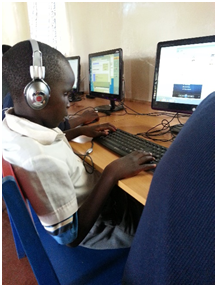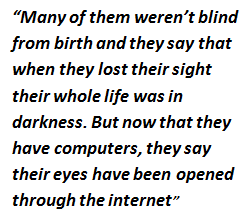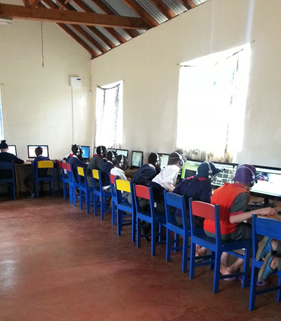A window to the online world for visually-impaired students in Kenya
Posted by: Djam Bakhshandegi, Citizenship and Partners in Learning Lead, Microsoft West, East, Central Africa and Indian Ocean Islands
In my role at Microsoft I spend a lot of time dealing with organisations who are making a positive impact in Africa. But there is one that is especially close to my heart because it supports children that not only confront many of the common challenges faced by children in Africa, but are also visually-impaired or blind. The Thika School for the Blind is a boarding school that provides learning facilities for over 200 visually impaired learners. Serving as the only high school for the blind in East and Central Africa, the boarding school offers speech therapy, living skills, braille and low vision classes to kindergarten, primary and high school learners.
 inABLE is an organization that works to connect these children – and many others across Africa- with computers and technology resources. With support from its funding partners including Microsoft, it launched Kenya's first assistive technology computer program at the Thika Primary School for the Blind in 2009.
inABLE is an organization that works to connect these children – and many others across Africa- with computers and technology resources. With support from its funding partners including Microsoft, it launched Kenya's first assistive technology computer program at the Thika Primary School for the Blind in 2009. 
The learners at Thika use normal computers with standard keyboards, to ensure they will be able to cope in a ‘normal’ work environment. Using text-to-speech screen readers, voice activated software and screen magnifier tools for students that retain partial sight, pupils can easily navigate around a normal computer. They easily access online educational resources, communicate with new friends worldwide, type essays, and research homework assignments, all while developing employability skills. Carol Ngandi, the lead computer instructor from inABLE says that children really enjoy the program, “They are able to send e-mails to friends and parents. They are able to go get the news and so they are able to be updated and they really enjoy that”.
Ngandi says that aside from providing the children with valuable skills, internet access alone gives blind children a window to the world that they can’t see. “Many of them weren’t blind from birth and they say that when they lost their sight their whole life was in darkness. But now that they have computers, they say their eyes have been opened through the internet”.
Walking around the school and meeting some of the children, I was reminded about how important it is to ensure equal access to technology.
“Although the world is full of suffering, it is full also of the overcoming of it ” – Helen Keller
 Irene Nthambi is one of the schools top learners excelling in computer literacy, despite being not only blind but also suffering from a disease that has left her unable to use her hands. She has mastered the unique ability to type with her tongue and lips, while using headphones to listen to what is written on screen. Irene’s teachers say she is one of the brightest children in the class, especially when it comes to using computers. Her excellence despite the impediments she faces highlights the program’s success.
Irene Nthambi is one of the schools top learners excelling in computer literacy, despite being not only blind but also suffering from a disease that has left her unable to use her hands. She has mastered the unique ability to type with her tongue and lips, while using headphones to listen to what is written on screen. Irene’s teachers say she is one of the brightest children in the class, especially when it comes to using computers. Her excellence despite the impediments she faces highlights the program’s success.
The World Health Organization estimates that at least 26.3 million people in Africa are visually impaired. The work by inABLE and Thika School is a shining example of what can be achieved when great people and organisations form strong partnerships; and at Microsoft we are very proud to have inspirational partners carrying out such important work.